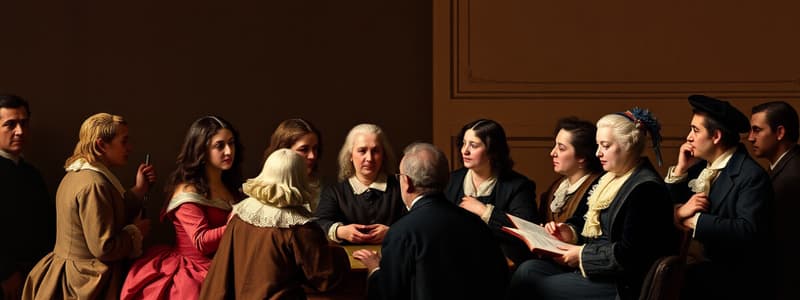Podcast
Questions and Answers
How has life changed from Native Americans/Puritans/Explorers to now?
How has life changed from Native Americans/Puritans/Explorers to now?
Concern becomes more about life on earth than the afterlife. Writings are about science, ethics, and government, rather than religion.
What was the primary purpose for writing?
What was the primary purpose for writing?
Persuasion
What were common forms of literature?
What were common forms of literature?
Essays and speeches
What is the age of reason?
What is the age of reason?
What did the age of reason mean?
What did the age of reason mean?
What four types of freedom does reason thrive on?
What four types of freedom does reason thrive on?
What is classicism?
What is classicism?
In literature, what is classicism based on and what is the focus?
In literature, what is classicism based on and what is the focus?
What are the five core ideas of classicism?
What are the five core ideas of classicism?
What was the growth of culture?
What was the growth of culture?
What is parallelism?
What is parallelism?
How is parallelism persuasive?
How is parallelism persuasive?
What is repetition?
What is repetition?
How is repetition persuasive?
How is repetition persuasive?
What is a rhetorical question?
What is a rhetorical question?
How is a rhetorical question persuasive?
How is a rhetorical question persuasive?
What is logos?
What is logos?
What does logos do?
What does logos do?
What is pathos?
What is pathos?
What does pathos do?
What does pathos do?
What is ethos?
What is ethos?
What does ethos do?
What does ethos do?
Flashcards are hidden until you start studying
Study Notes
Change from Early Societies to Modern Life
- Shift in focus from afterlife concerns to earthly life
- Contemporary writings emphasize science, ethics, and governance over religion
Purpose of Writing
- Primary aim is to persuade the audience
Common Literary Forms
- Prominent forms include essays and speeches
Age of Reason
- Era characterized by reliance on reasoning and common sense for self-management
- Individuals sought to challenge authoritative figures and tradition
Implications of the Age of Reason
- Aimed to eradicate social evils and superstitions, leading to enhanced quality of life
Types of Freedom Essential for Reason
- Advocates for freedom of speech, independence from arbitrary rulers, ability to experiment, and freedom to question laws and institutions
Classicism Overview
- Artistic movement prioritizing restraint, rationality, and structured forms
Basis and Focus of Classicism in Literature
- Literature hinges on rational thought, intending to explore science, ethics, and governance
Core Concepts of Classicism
- Values tradition and universality, emphasizing reason, clarity, balance, and order
- Asserts that human nature adheres to fixed laws, valuing rationality over imagination and social over individual perspectives
Cultural Growth in America
- Emergence of a unique American identity capable of standing alongside European achievements
- Revolutionary sentiments encouraged self-expression and urban growth, with populations nearly doubling
Understanding Parallelism
- Utilizes grammatically similar sentence components for structural coherence
Persuasiveness of Parallelism
- Creates a rhythmic flow in language, enhancing the memorability of ideas through repetition
Concept of Repetition
- Literary technique that employs repeated phrases to clarify concepts
Effectiveness of Repetition
- Draws attention to key points, reinforces ideas, and adds dramatic flair to speech
Definition of Rhetorical Question
- Aimed at emphasizing a point rather than requiring an answer
Persuasiveness of Rhetorical Questions
- Engages the audience emotionally, prompting desired responses from speakers
Logos in Persuasion
- Appeals to logic, reasoning, and factual evidence
Function of Logos
- Establishes credibility, goodwill, and ethical standing in discourse
Pathos Explained
- Appeals to emotional responses such as fear, pride, or hate
Role of Pathos
- Engages the audience using visual language and emotionally charged terms
Ethos Defined
- Appeals to the speaker's character and shared values
Purpose of Ethos
- Utilizes deductive reasoning (syllogism) and implied premises (enthymemes) to persuade through character credibility
Studying That Suits You
Use AI to generate personalized quizzes and flashcards to suit your learning preferences.




